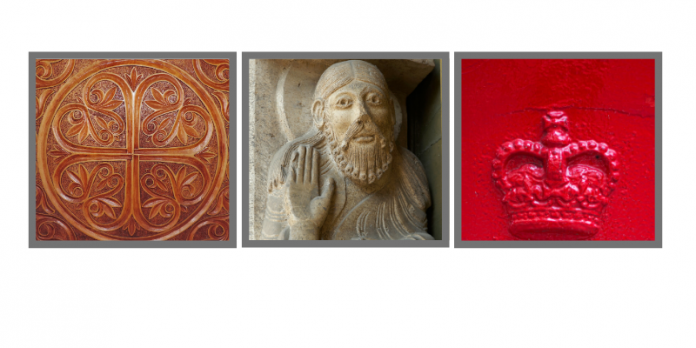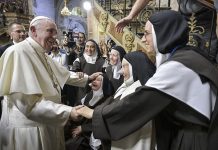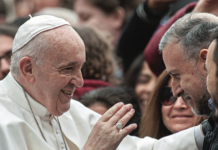
The threefold office of baptized persons
JASON GALE
In Baptism, the person receives an anointing in which he or she is “incorporated into Christ who is anointed priest, prophet, and king” (CCC, 1241). When we are teaching this reality of Baptism, we can use it as model for our lives that emphasizes both communion and diversity. This is important as laypeople because even though we are all called to be holy, we do this in different ways and degrees from the clergy. St. John Paul II stated beautifully:
The unity of the Church is not uniformity, but an organic blending of legitimate diversities. It is the reality of many members joined in a single body, the one Body of Christ (cf. 1 Corinthians 12:12). Therefore the Church of the Third Millennium will need to encourage all the baptized and confirmed to be aware of their active responsibility in the Church’s life. Together with the ordained ministry, other ministries, whether formally instituted or simply recognized, can flourish for the good of the whole community, sustaining it in all its many needs. (John Paul II, Novo Millennio Ineunte, 46; emphasis added).
This threefold office has a very practical application in each of our lives. We can begin our catechesis with three questions:
1. What does a priest do? (or What is a priest?)
2. What does a prophet do? (or What is a prophet?)
3. What does a king do? (or What is a king?)
Priest
Drawing on the priesthood of the Old Testament, a priest is one who offers sacrifices (see
Genesis 14:18; Exodus 29:38- 42; Leviticus 23:6,8). Some sacrifices are personal, and some are on behalf of others. As catechists, we can offer this as the first aspect of the Christian way of life. In union with Christ (through Baptism), we offer sacrifices as laypeople, many corresponding to our specific vocations. This will look different depending on our vocation and work, but we are all united to the same Christ.
Prophet
A prophet is a spokesperson for God, or one who speaks on God’s behalf (see Exodus 4:30;
Deuteronomy 18:18; Isaiah 42:19). In the Old and New Testaments, prophets called people to a different way of life. It is a way of life determined by God’s revelation and not our own self-defining. The Christian difference is a selfless way of life — first, loving God, our Sovereign King, and second, loving all of his creation, the highest of which are people. This transcendent witness to the Gospel can lead others to God. It does not point selfishly to oneself, but to Christ who has reconciled us to the Father. In our union with Christ through Baptism, we become prophetic witnesses to God’s loving plan of salvation. In our world today, we need prophets in all corners of the world and society.
King
The aspect of king is where we begin to point to all three together. So what does a king do? A king rules. But for the Christian, what or who does the king rule? First and foremost, we are called to rule over ourselves, not in a self-absorbed way, but in a way that we are free from addiction and vice so as to choose what is good and from God. It is important for the catechist to live this out. First, it is a humble response. Second, a king usually is understood as ruling over others, but for the Christian, being a king is a call to servant-leadership. The role of our internal spiritual lives becomes clearer when we look at priest, prophet, and king together.
A holistic understanding
Here is how to tie it all together as a way of life. Many people understand this basic principle: You cannot give what you do not have. I cannot give you $100 if I do not first possess $100. So in my Baptism, if I am called as priest to offer my life as living sacrifice, what must I first possess? Myself. So as king, we rule over ourselves so we may offer the sacrifice of our lives for God and others. By doing so, we become a prophetic witness to Christ the King. When teaching this, you can begin or end with king, as it is a somewhat cyclical understanding.
1. What does a king do? (or What is a king?) Rule over one’s self so that he may offer sacrifice.
2. What does a priest do? (or What is a priest?) Offer sacrifice which becomes prophetic.
3. What does a prophet do? (or What is a prophet?) Witness to God, the Sovereign King.
We cannot make our lives a living sacrifice if we do not first rule over ourselves. This includes our thinking, our passions or emotions, and our actions. In Baptism we are truly united to Christ, and this union establishes a life of grace that only we can cut off (by sin). The graces to rule over ourselves so we sacrifice our lives and thus become prophetic are all present in our union with Jesus. How this looks in each person’s life will be different and unique, but the union with Christ in Baptism becomes the unity of Christians, no matter how diverse the parts of the Body are. This way of life is the universal call to holiness.
The way to holiness
These three elements serve as the way for holiness of life. As Catholics, we are called to live a virtuous life, free of vices and with full self-possession, in order to make a gift of ourselves to others — as Christ did on the cross. Our imitation of Christ makes him present to the diverse people God places in our path. When this is accomplished by each member of his Church, the Body of Christ accomplishes her mission and participates in the threefold office of priest, prophet, and king.
FROM VATICAN II: On the Vocation of the Laity:Sharers in the priestly, prophetic, and kingly functions of Christ
The term laity is here understood to mean all the faithful except those in holy orders and those in the state of religious life. … These faithful are by baptism made one body with Christ and are constituted among the People of God; they are in their own way made sharers in the priestly, prophetical, and kingly functions of Christ; and they carry out for their own part the mission of the whole Christian people in the Church and in the world.
What specifically characterizes the laity is their secular nature. … [T]he laity, by their very vocation, seek the kingdom of God by engaging in temporal affairs and by ordering them according to the plan of God. They live in the world, that is, in each and in all of the secular professions and occupations. They live in the ordinary circumstances of family and social life, from which the very web of their existence is woven. They are called there by God that
by exercising their proper function and led by the spirit of the Gospel they may work for the sanctification of the world from within as a leaven. In this way they may make Christ known to others, especially by the testimony of a life resplendent in faith, hope and charity. Therefore, since they are tightly bound up in all types of temporal affairs it is their special task to order and to throw light upon these affairs in such a way that they may come into being and then continually increase according to Christ to the praise of the Creator and the Redeemer. — Lumen Gentium, 31
The lay apostolate, however, is a participation in the salvific mission of the Church itself. Through their baptism and confirmation all are commissioned to that apostolate by the Lord Himself. Moreover, by the sacraments, especially holy Eucharist, that charity toward God and man which is the soul of the apostolate is communicated and nourished. Now the laity are called in a special way to make the Church present and operative in those places and circumstances where only through them can it become the salt of the earth. Thus every layman, in virtue of the very gifts bestowed upon him, is at the same time a witness and a living instrument of the mission of the Church itself. … — Lumen Gentium, 33
Each individual … must stand before the world as a witness to the resurrection and life of the Lord Jesus and a symbol of the living God. All the laity as a community and each one according to his ability must nourish the world with spiritual fruits. They must diffuse in the world that spirit which animates the poor, the meek, the peace makers — whom the Lord in the Gospel proclaimed as blessed (Cf. Mt. 5:3-9).
In a word, “Christians must be to the world what the soul is to the body” [Letter to Diognetus]. — Lumen Gentium, 38
[Emphasis added. Read more at CATmag.us/LumenGentium.]
Jason Gale, MA, LDiv, is the Director of the Catechist Formation Program at Aquinas College in Nashville, Tennesee. He has earned two Master’s degrees in Theology and also received an Ecclesiastical License of Divinity in Catechetics.
This article was originally published in Catechist magazine, September 2019
PHOTOS (L-R): PIXNIO, CRISFOTOLUX/ISTOCK, RYAN JOHNS, UNSPLASH




